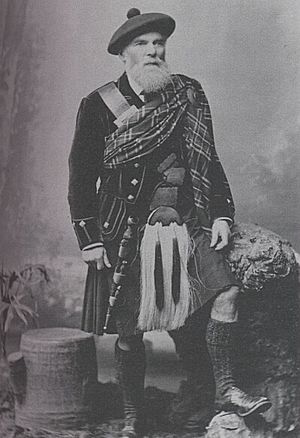John Murdoch (editor) facts for kids
John Murdoch (1818 – 1903) was a Scottish newspaper owner and writer. He was a champion for land reform. He played a big part in helping crofters get their rights in the late 1800s.
Contents
Early Life and Influences
John Murdoch was born in 1818 in a place called Ardclach in Nairn, Scotland. His father was also named John Murdoch, and his mother was Mary Macpherson. When John was nine years old, his family moved to the island of Islay. He lived there until he was 20.
After leaving Islay, John worked in a shop in Paisley. Soon after, he joined the Excise service, which collected taxes. He worked in different places like Kilsyth, Lancashire, and Ireland.
Life on Islay
While growing up on Islay, John Murdoch became friends with the family of the island's owner, called the laird. The laird, Walter Frederick Campbell, was kind to his tenants. But during the Highland Potato Famine, he went bankrupt because he refused to evict people. His creditors then sold Islay to James Morrison. This led to the start of the Highland Clearances on the island.
The Clearances were a sad time when many people were forced off their land. John Murdoch saw how unfair this was. This experience made him want to protect the Gaelic language and fight against the great power that landlords had over the land.
New Ideas and Movements
In the 1840s, John Murdoch spent time in Armagh, Ireland, and in Lancashire, England. Here, he learned about a movement called Chartism. The Chartists believed that ordinary people should own their own land. They thought this would make rural communities stronger and more independent.
Later, in the 1850s and 1860s, Murdoch lived in Dublin, Ireland. He learned about Irish nationalism and the "Land War." This was a movement where Irish people fought for their rights to the land. He even wrote articles for an Irish nationalist newspaper called The Nation. These experiences helped shape his strong beliefs about land reform.
Fighting for Rights with The Highlander
After retiring, John Murdoch moved to Inverness. He quickly became a well-known figure. He supported a famous poetess named Mairi Mhòr nan Oran when she faced legal trouble. He helped her get a lawyer.
The Highlander Newspaper
Soon after, he started editing a weekly newspaper called The Highlander. This newspaper ran from 1873 to 1881. Even though it faced money problems, it was very important. Many of its articles were in English, but it greatly influenced Scottish Gaelic literature and the opinions of ordinary people in the Highlands.
John Murdoch believed that the unfair economic system was hurting the Highlands and Islands. He thought landlords' greed and unfair laws were causing many problems. He felt that crofters and peasants needed to stand up for themselves. He wanted them to take action, similar to what happened in the Irish Land War.
The Idea of Dùthchas
Murdoch and other campaigners used a Gaelic idea called dùthchas. This idea meant that all clan members had a right to live in their clan's territory. It meant the land belonged to the whole clan, not just to the clan chief as their personal property.
Murdoch also argued that forcing people to speak English and giving up Gaelic was hurting the confidence of the Gaels. He believed this also needed to change as part of the land reform fight. John Murdoch, often seen wearing his kilt, became known as Murchadh na Feilidh ("Murchadh of the Kilt"). He encouraged crofters to be proud of their country, their heritage, and their language.
A Lasting Impact
Many people believe John Murdoch was the most important person in creating the situation that led to the Crofters' War. This was a time when crofters actively protested for their rights. It also led to the Napier Commission, which investigated the crofters' problems.
The Crofters Act of 1886
All of this resulted in the Crofters Act of 1886. This law was a huge victory for crofters. It gave them:
- Fair rents for their land.
- Money for improvements they made to their land and homes.
- Most importantly, security of tenure. This meant crofters could not be easily removed from their land.
Historians have called the Crofters Act the "Magna Carta of the Highlands and Islands." It meant that mass Clearances could no longer happen. People in the Highlands could now vote without fear of being punished.
John Murdoch also influenced Rev. Donald MacCallum, a minister who challenged the powerful landlords. MacCallum used the Bible to argue for changes to land ownership laws, a theme Murdoch often wrote about.
Political Views
While many land reform leaders were part of the Liberal Party, John Murdoch was a socialist. He believed in sharing wealth and power more fairly. He ran for election in 1885 but did not win. He also encouraged Keir Hardie, a famous Scottish politician, to run as an independent worker's candidate. Murdoch was even one of the people who helped start the Scottish Labour Party.
John Murdoch passed away on January 29, 1903, in Saltcoats, Scotland. He is buried in Ardrossan cemetery. His work had a lasting impact on the rights of crofters and the history of the Scottish Highlands.
 | Aurelia Browder |
 | Nannie Helen Burroughs |
 | Michelle Alexander |


